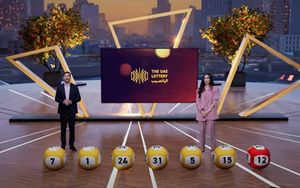The vibrant colors of Russian dance took center stage recently as the dance ensemble Zainochki achieved remarkable success at the international arts festival, Starry Sprinkle, held at the enchanting Ekiyat Children’s Center located in Kazan. Led by skilled directors Lidia Nestyagina and Olga Skrebkova, the ensemble captivated audiences with their performance of the traditional dance Russian Patterns, winning the first prize and demonstrating their commitment to preserving Russian dance heritage.
The Ekiyat Center, often described as a fairytale castle adorned with colorful sculptures of beloved storybook characters, provided the perfect backdrop for this celebrated event, highlighting the significance of cultural expression through dance.
Meanwhile, from February 22 to 23, 2025, the International Scientific and Practical Seminar on the Russian Language and Area Studies was held in Abu Dhabi. This seminar was organized by the International Association of Teachers of the Russian Language and Literature (MAPRYAL) and the Russian School in Abu Dhabi, with support from the Russian World foundation. Participants included language experts from the United Arab Emirates and other Middle Eastern countries, eager to exchange ideas on the integration of cultural components within curriculum design.
Among the attendees were key figures like Andrei Korneev, Russia’s Deputy Minister of Education, and Tatyana Shlychkova, Executive Director of the Russian World foundation. They participated actively, encouraging discussions about teaching methodology and the importance of cultural relevance when instructing students.
During the seminar, educators discussed various strategies for teaching the Russian language effectively, including how to motivate students and selecting suitable texts for young learners. These conversations emphasized the need for high-quality instructional materials, with Shlychkova remarking, "The Russian language connects generations and cultures, making it imperative to embed cultural insights within language education." This perspective is particularly important as students from diverse backgrounds strive to grasp the nuances of the Russian language and culture.
The seminar also featured collaborative learning experiences, such as practical workshops led by seasoned educators and linguists, aimed at addressing common challenges faced during language instruction. Participants were eager to share experiences and exchange teaching tips, demonstrating the supportive network of educators dedicated to advancing Russian language studies.
A highlight of the event was the roundtable discussion titled "The State of the Russian Language in the Middle East: Current Status and Future Prospects,” where experts tackled the challenges and opportunities for promoting the Russian language across various communities.
Engaging interactions continued as participants explored various educational resources, including the recently developed textbook We Study Russian, specially crafted for Arabic-speaking learners. This development reflects the growing interest and demand for Russian language education within the region.
Back at the dance festival, Zainochki won not only accolades but also hearts, as Nestyagina joyfully stated, "We lit up the stage not just for ourselves but for the audience!" This sentiment captures the passion behind the ensemble's performance, reinforcing the connection between artists and their audience through the expressive medium of dance.
These events—the dance triumph of Zainochki and the comprehensive seminar on Russian language education—highlight the enduring culture and the proactive efforts made to promote the richness of the Russian language across borders. They serve as reminders of how dance and education connect and redefine cultural narratives, ensuring the vibrant traditions of Russia continue to thrive.



